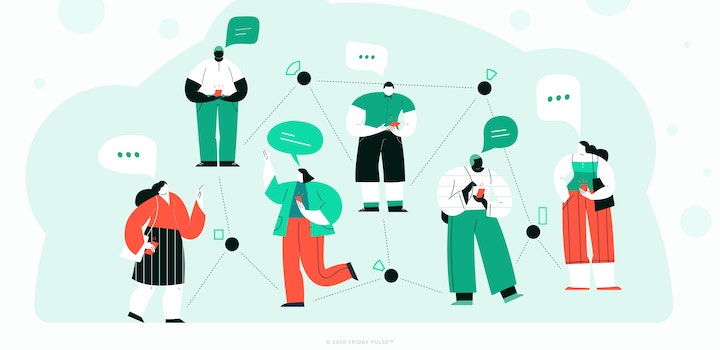
Could you be happier at work?
Take our quiz and find out! It takes just five minutes and you'll get a data-packed report afterwards.
How to maintain your core (relationships) while working remotely
How well people cope during difficult times is dependent on the quality of the relationships they have with friends, family and work colleagues — especially now in the time of lockdown.

Just as our core muscles need maintaining so do our core relationships. As we seek to adapt to the crisis, clear communication from leaders is essential but it is our relationships that will sustain us.
Your core social circle
Oxford University Professor Robin Dunbar found that the size of a social network is estimated to be around 150 people. He also observed that we have two smaller circles of relationships — intimate and close friends. We tend to have up to five intimate friends and up to 15 close ones. He found that when we suddenly have a new intimate relationship (especially a romantic one), then the intensity of that relationship shakes up the broader social network — almost a case of one in and one out.
He estimated that we typically dedicate 40% of our emotional time and efforts towards our tight five and a further 20% to the next circle of ten friends. In other words, our core 15 always have 60% of our attention.
Today, as our social worlds shrink, hopefully it is comforting to recognize we get the majority of our emotional sustenance from just 15 people. These people deserve our focus and for now we can suffice with using online platforms like Facebook, TikTok and Instagram to keep in touch with the rest of our social network (the remaining 150).
How to maintain your core work relationships
How does the Dunbar model apply to our work organizations? We know that the people we work with — our teams and departments — determine both the quality of our work and also our experience of work. His three groups are identifiable: those that we work with the majority of the time, the second circle of people we engage with regularly, and the third circle of occasional contact. In our new remote working world, how do we ensure that we continue to build, support and nurture these relationships we know are critical to our businesses?
Identify your core 15
At work, these are the people who you are interdependent with. Think of the people that are most critical to you and your work. Some may be in your own team, others in different departments. Don’t forget about people who challenge you as well as those that support you – there is a danger we will all retreat into silos and lose the valuable insights we gain from different viewpoints.
Maintain your personal relationship with them
It’s not just about the work you do, but also your personal relationships. Ask them how they are feeling and how they are coping with working from home. Have social calls and chat in the same way you would have if you went for a coffee. Share a joke with them or a funny story. Laughter is a great way of connecting with people, even when we are physically distant.
Take responsibility for relationships
Organizations should consider giving someone the role of being ‘head of relations.’ In families, there’s often one person that plays the role of ‘maintainer’ — one that takes it upon themselves to keep in touch with everyone and let everyone else know their news. In organizations, this could be an internal comms role or a person that drafts internal newsletters to share news throughout your department or across teams. This will help keep the broader group (the 150) more connected and aligned.
Connect, connect, connect
Whether it’s a business-critical function or a personal relationship, in the end, it’s about our ability to connect to those that are most important to us. Though we may feel like we’re alone during this period of remote working and social distancing, we are all still connected. The relationships we’ve formed are still there and can be a real source of comfort.
We're here to help
Friday Pulse is designed to help teams stay connected even when working remotely. Each week, our people platform provides an opportunity for you to share your experiences as well as publicly appreciating colleagues who have supported you.
If you are interested in learning more, please contact George Hargreaves, Head of Helping People, at george@fridaypulse.com.__
Read our top tips on maintaining your core relationships at work here